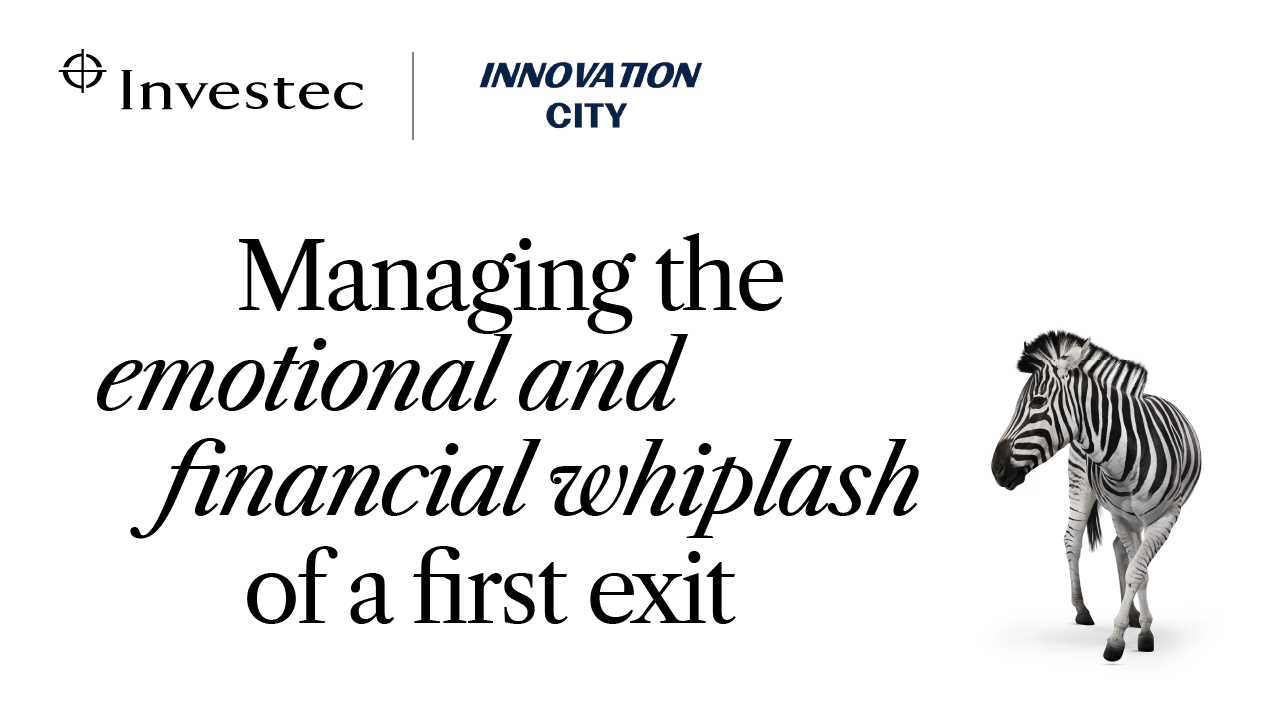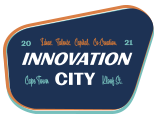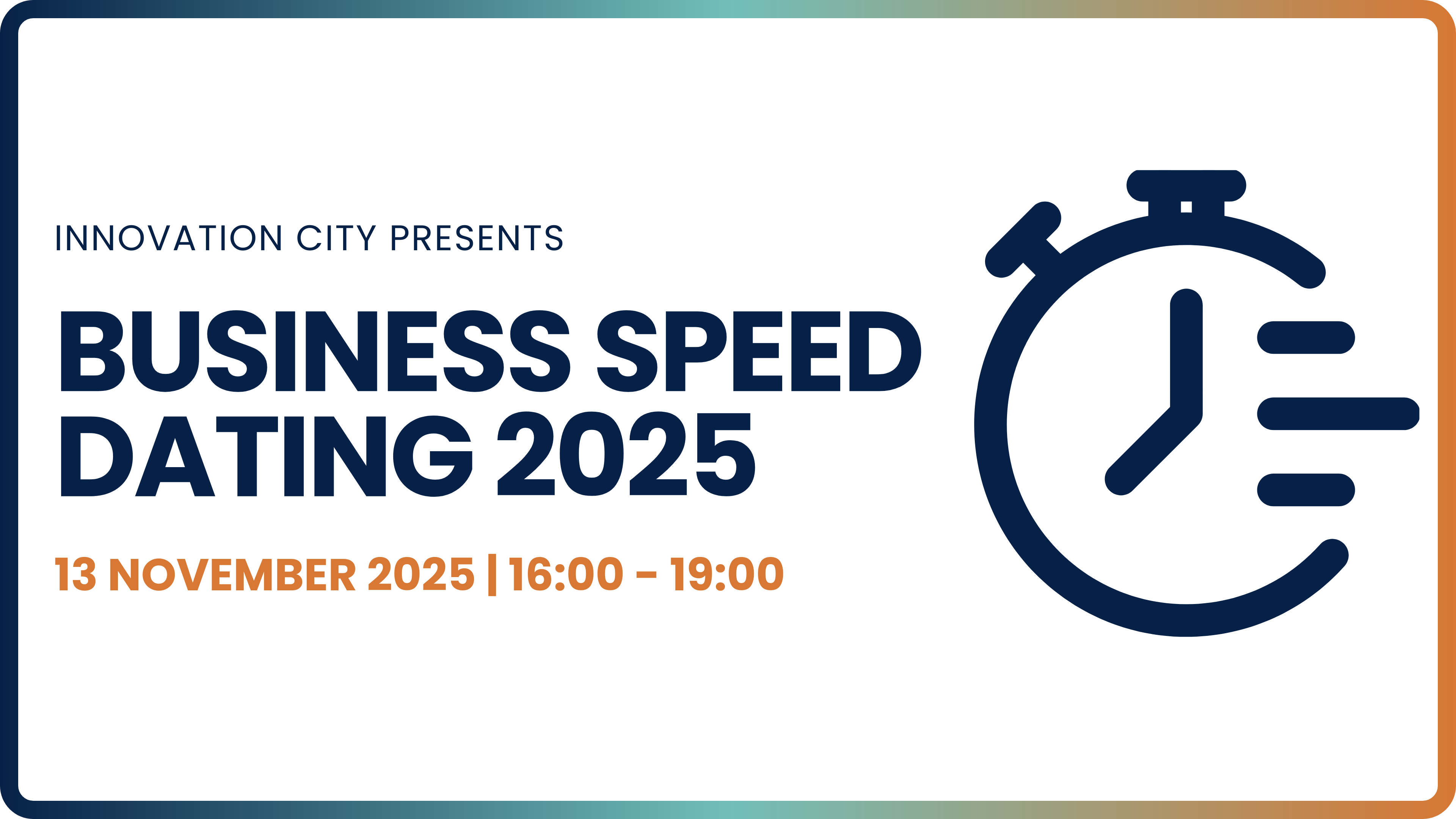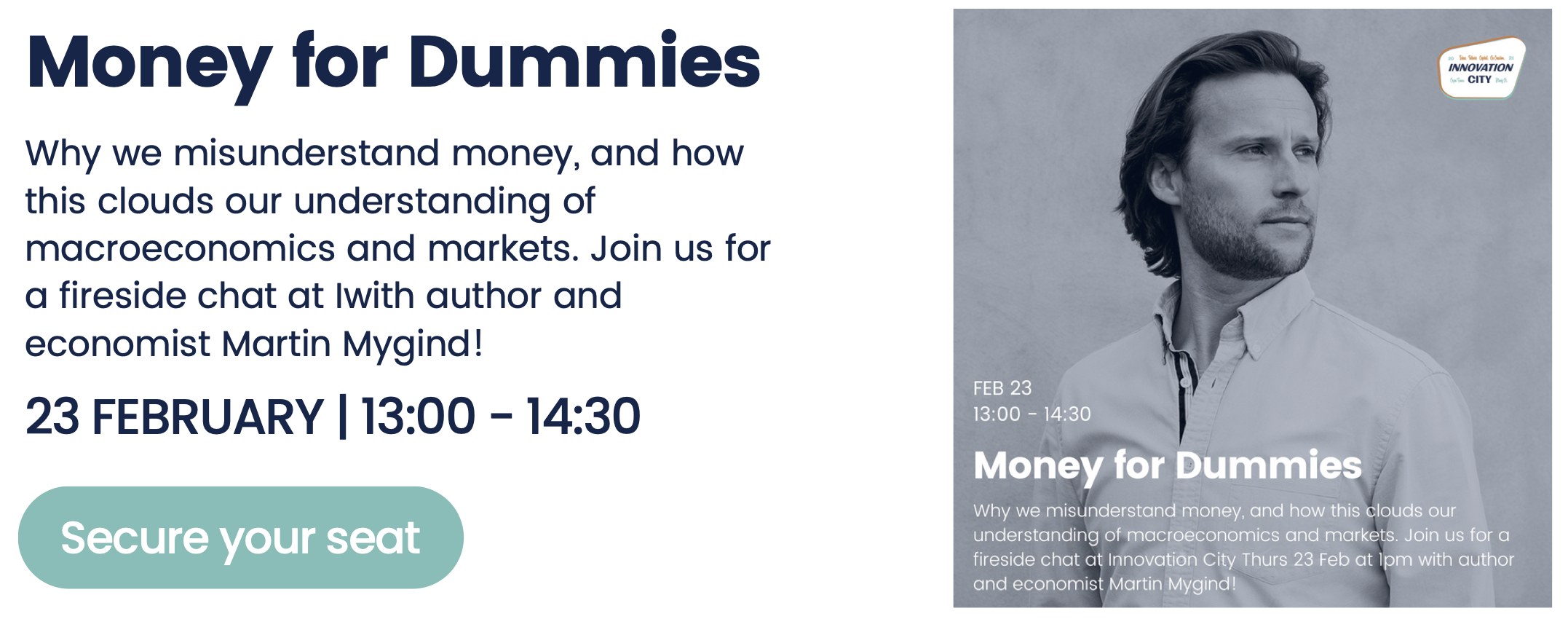
28 Oct Managing the Emotional and Financial Whiplash of a First Exit
Every great enterprise begins as an act of belief. In 1974, three South African founders; underestimated, unconventional and unafraid built what would become a global success story and a benchmark of excellence in private banking and wealth management. That same entrepreneurial pulse still runs through Investec today, a belief that ingenuity and integrity can coexist, that merit should rise and that innovation is applauded.
Investec’ clients share this DNA: bold entrepreneurs who build, scale and reimagine what’s possible. From backing South Africa’s top founders to shaping the next era of financial innovation, Investec continues to stand at the forefront of futureproofing.
Partnering with Innovation City, Cape Town’s nexus for start-ups and technology entrepreneurs, reflects that alignment. Together, we’re focused on strengthening the ecosystem that supports founders, providing the networks, insight and guidance they need to scale sustainably and shape the next chapter of South Africa’s innovation economy.
Managing the Emotional and Financial Whiplash of a First Exit
For the first-time founder, an initial public offering (IPO) or acquisition is often described as a “liquidity event.” In truth, it’s an identity event. After years of living on adrenaline, risk and delayed gratification, the sudden shift from builder to beneficiary can feel less like arrival and more like disorientation.
The spreadsheet says success, but the body feels something different, a quiet emptiness where the urgency once lived. The phone is still. Investors no longer call. For the first time in years, you have time. And money. And questions.
This is the moment that demands not reaction, but reflection.
The Key Shift from Creator to Custodian
Founders are natural risk-takers, but concentrated risk, the same kind that drives a start-up’s success, can endanger personal wealth. Many first-time exiters struggle to move from “growth at all costs” to “preservation first.” Turning a one-off liquidity event into lasting financial independence requires a different mindset. It’s less about speed and disruption and more about discipline and stewardship.
The first, and perhaps most counterintuitive, step is to slow down. “Many founders underestimate how complex their personal tax and structuring needs become overnight,” says Investec Wealth Manager, Tshego Ramatlo. A sudden windfall can tempt over-spending or under-planning.
Entrepreneurs could face income tax on share options, or unexpected liabilities if they’ve relocated or have international investors. Early engagement with a wealth manager and tax adviser ensures proceeds are preserved efficiently, through trusts, family investment companies or offshore wrappers. Acting before shares vest or proceeds settle can dramatically alter outcomes.
After years of running a company, you’ll need a new “board”, a wealth manager, tax adviser, investment professional and lawyer who work collaboratively. The modern wealth manager is less a single adviser and more an orchestrator of expertise. They coordinate lawyers, accountants, tax specialists and sometimes act as ‘psychologists’ to help founders transition from building companies to stewarding capital. The best advisers don’t just protect assets; they protect bandwidth freeing founders to focus on the next chapter, knowing their financial ecosystem is managed holistically.
A skilled wealth manager translates entrepreneurial instinct into disciplined strategy balancing public markets, private investments, alternatives and sustainable assets. The best relationships become partnerships in stewardship rather than just portfolio management.
The Emotional Side of Liquidity
Most new wealth stories begin with a rush to act, the property portfolio, the holding structure. These are important steps, but they can also mask a deeper transition: the need to redefine purpose once the metrics disappear. Founders are trained to optimise, to move fast, to solve. Yet post-exit wealth invites a slower kind of intelligence, one that values patience, discernment and long-term design.
The smartest founders treat this period as a new start-up in itself a start-up of self. What’s the vision? What are the values? What ecosystem do you want your capital to nourish?
From Preservation to Regeneration
Traditional wealth management has long focused on protection, asset allocation, tax efficiency and multi-jurisdictional diversification. These remain essential foundations. But increasingly, next-generation founders are shifting from preservation to regeneration.
They’re asking not only “How do I keep what I’ve built?” but “How can what I’ve built continue to build value, for others, for the planet, for the future?”
Alternative assets have become a defining trend. UK wealth managers report record allocations to private equity secondaries, venture funds, private credit and commercial real estate, all offering inflation protection and low correlation to traditional markets. Many founders, comfortable in illiquid environments, find these intuitive.
A growing number of entrepreneurs also want their capital to reflect their values, whether that’s decarbonisation, healthcare innovation or diversity in venture capital. Wealth managers are responding with thematic portfolios and impact vehicles aligned with the UN Sustainable Development Goals. “The younger generation of founders see capital as a form of influence,” says Ramatlo. “They want to invest with purpose, not just profit.”
The Rise of Conscious Capital
The wealth landscape is evolving fast. Across the UK and Europe, private banks and family offices are blending behavioural finance with sustainability frameworks and digital tools that offer real-time insight into portfolio performance and impact. AI analytics now track how investment decisions ripple through supply chains, carbon outputs and local economies, creating a clearer view of where capital truly lands.
Founders, by instinct, think in systems. The challenge now is to extend that mindset beyond code and into capital, to treat wealth as another kind of ecosystem, capable of regeneration as well as return. Managed with intention, wealth can become an instrument for innovation, community well-being and environmental resilience.
The Next Chapter
An exit is not an ending. It’s the next prototype. The test now is not whether you can build fast, but whether you can build meaningfully.
When founders approach wealth as a living system, one that grows through care, curiosity and coherence, they discover that legacy isn’t something written later. It’s coded in every choice made now.
And in the quiet after the IPO, that’s the real work: to design wealth that endures, not just for yourself, but for the world your innovation helped shape.
To learn more about working with a Wealth Manager at Investec click here.









